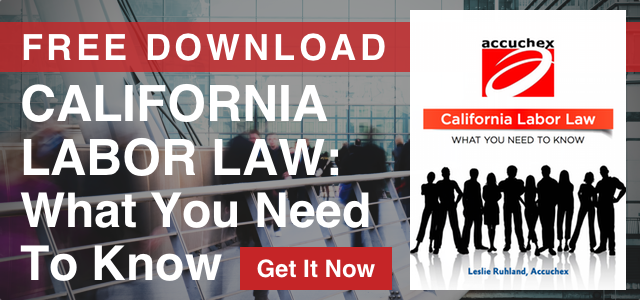 California businesses and employers often feel assailed by the ever increasing labor laws California and the federal government continually add.
California businesses and employers often feel assailed by the ever increasing labor laws California and the federal government continually add.
In addition, their seems to be the inevitable increase in costs associated with the new labor laws in the form of direct costs to employees, costs to the state, and increased costs of compliance and reporting.
Navigating New Labor Laws: California, National, and Local
A number of new laws - or changes to existing laws - require employers and HR professionals to be diligent with compliance and reporting policies and practices.
A lapse in compliance can be an expensive and potentially devastating oversight for an employer. Your HR policies and practices must be adjusted according to the stipulations of these new laws and requirements.
San Francisco Adds Their Own Family Leave Law
On April 5, 2016 San Francisco became the first city in the country to require employers to offer six weeks of fully paid leave for new parents.
The new law comes one day after the state of New York passed a law requiring up to 12 weeks of partially paid time off for new parents.
The state of California already has one of the most generous family leave lawsin the U.S. that requires employers to provide 55% of wages for up to six weeks of paid family leave.
The new San Francisco ordinance requires business owners with more than 20 employees to pay the remaining 45% of their employees’ wages. It applies to parents of either genders and to both full- and part-time employees who work in the city.
The law takes effect January 2017 with a gradual phase in for smaller businesses. Businesses with 35 employees or more must comply by July 1, 2017. Businesses with 20 or more employees have until January 2018.
The proposal received little support from San Francisco's business community.
"It’s already a struggle in San Francisco because there’s so many mandates placed on businesses and the city doesn’t differentiate between small and big business,” said Dee Dee Workman, the San Francisco Chamber of Commerce 's vice president of public policy.
San Francisco’s Office of Economic Analysis found the ordinance would likely increase household spending, but that it could also “increase the cost of hiring, slow job creation and replacement.”
If both men and women take advantage of the benefits, it could cost San Francisco businesses about $32.3 million annually, the office estimated.
Retail Employees and Others in California Can Now Have a Seat
On April 4, 2016 the California Supreme Court issued a decision that will require employers in California to provide suitable seating for employees.
The decision was in response to a class-action lawsuit against the pharmacy chain CVS, one of dozens filed in California during the last several years against corporations that required workers to stand.
In a unanimous ruling Monday, the court clarified labor law and makes it more difficult for companies to deny workers a chair.
The issue reached the state's top high court in response to questions from the U.S. 9th Circuit Court of Appeals, which is reviewing three pending class-action cases by workers. The 9th Circuit asked the California court to clarify state law.
In the decision, Justice Carol A. Corrigan wrote for the court:
“There is no principled reason for denying an employee a seat when he spends a substantial part of his workday at a single location performing tasks that could reasonably be done while seated, merely because his job duties include other tasks that must be done standing,”
Whether a worker is entitled to a seat depends on “the totality of the circumstances,” including whether a task can be performed from a chair, whether seating the worker would interfere with job performance and whether the physical layout of the work space is conducive to seating, the court said.
The court added that an employer may not design a work space to “further a preference for standing” and must consider whether it could be reasonably changed to accommodate a chair or stool.
“If the nature of the work reasonably permits seated work,” the court said, the law “unambiguously states employees ‘shall be provided with suitable seats.'”
According to attorney Michael Rubin, who represented workers in the cases before the state high court and the 9th Circuit, said the decision would have a “huge impact” and affect “almost every industry” in the state, especially retail.
“Employers can no longer force workers to stand at the job all day in a fixed location when the actual job tasks could be performed while seating,” he said.
The Affordable Care Act and Reporting Requirements 2016
Beginning in 2016, employers with 50 – 99 full-time or equivalent employees need to report their employee’s health care status to the federal government, based on current ACArequirements.
In December, many employers ran into difficulties when many of their health care plans expired, and they had to choose a new plan and switch carrier. This resulted in higher deductibles and out-of-pocket costs along with decreased benefits for employees.
According to Victor McKnight, principal at EPIC Insurance in Petaluma:
“The reporting has been a bear for those with more than 50 employees. It’s like learning a new language and a new system. Many small employers made significant changes to their plans in late 2015 or January 2016, so the employees are working through the changes.”
The deadline for filing Forms 1095 and 1094 has been extended from Feb. 29 to May 31 2016 if filing via paper. If filing electronically, the deadline has been extended from March 31 to June 30.
Penalties for non-compliance with the mandate are $2,000 per employee. As long as employers make a good faith effort to file, however, the IRS has said they would be lenient and not issue a fine.
Be Informed and In Compliance
Updating your HR polcies regularly will help your organization meet its obligations, while providing accuracy and timeliness. So take time to understand the laws, automate time and attendance tracking and calculations, and prioritize accurate record keeping. In this way, you will make compliance a sure thing.
Another key step in maintaining HR compliance and increasing your company's cost-effectiveness is to consider outsourcing. A professional agency such a Accuchex can provide much-needed help with Human Resources needs and questions. Accuchex is a full spectrum Payroll Management Services provider offering expertise in Time Management, Insurance and Retirement issues, as well.
If you are looking for reliable resource for your HR issues, we can help. And you can get your Free Download: California Paid Sick Leave Law to help you make an informed decision, or call Accuchex Payroll Management Services at 877-422-2824.



